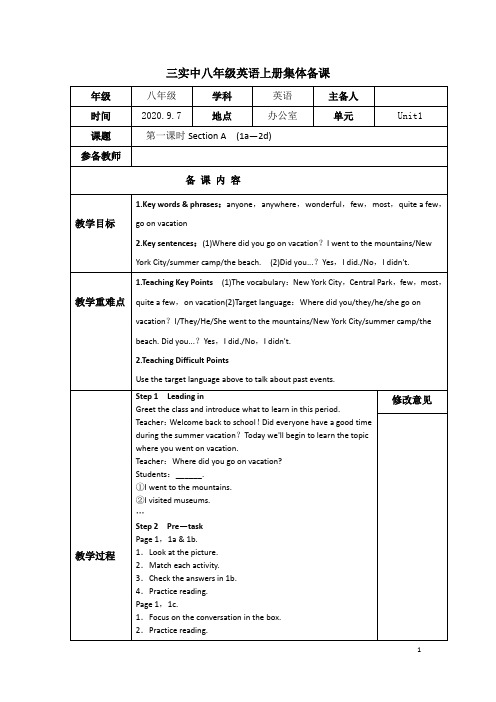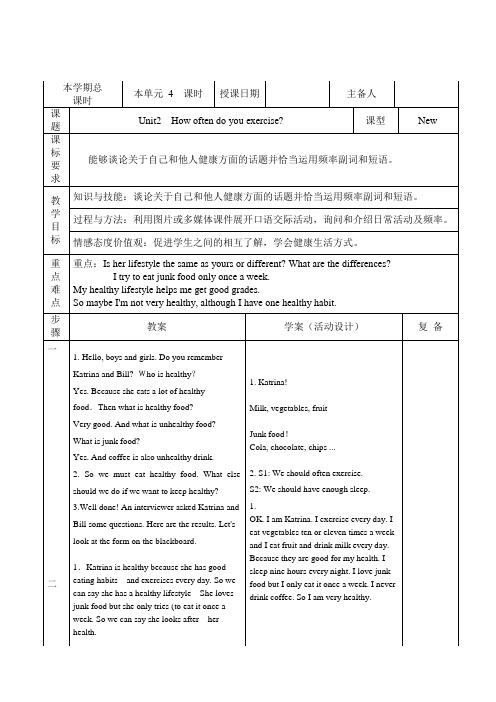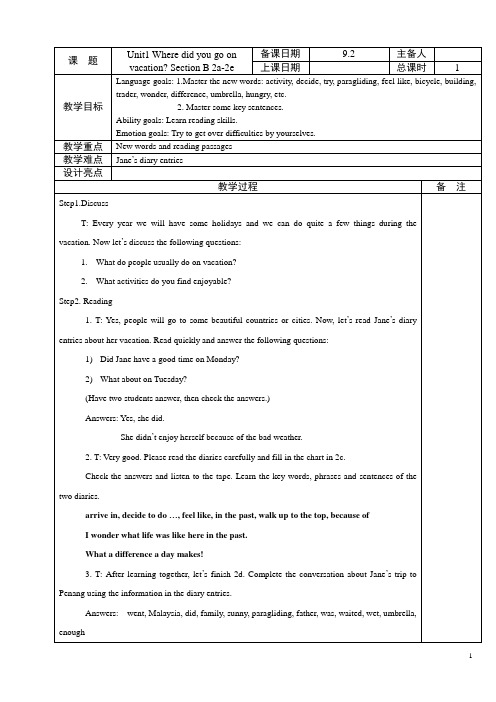八年级英语上册unit1—4集体备课
- 格式:doc
- 大小:358.50 KB
- 文档页数:28


Unit 1 Lesson 4教学目标.To listen and understand the text about best friends1. To learn simple sentence 教学重难点To learn to talk about friendship with some key words and useful expressions 教学过程一、导入Who is your best friends?What do you like about him/her?Did you ever argue your best friends? Why?二、新课讲解Lead inHow should we get on with our best friends?Grant often copieslectures from the internet.一Will you lend me your bike?一Yes, of course.To hersurprise, Sally won the first prize in the English contest.Friends are not enemies, we could make a deal. We could doourown homework first and play basketball later.Grammar Learning TipA simple sentence contains only one independent clause. Look at these:Patrick didn' t agree. ( Subject + Intransitive Verb)The two boys made a deal. ( Subject + Transitive Verb+ Object )Patrick felt awful. ( Subject +Link verb + Predicative)I won' t lend you my homework. ( Subject+ Verb + IndirectObject + Direct Object)简单句分为五种基本类型:1.主语+谓语They laughed.The students are singing.2.主语+谓语+宾语I like English.Jenny is reading a book.3.主语+系动词+表语Ms. Liu is kind and patient.Jenny looks very happy.The days get longer in spring.常用的系动词有:be, become, turn, look, feel, smell, taste,sound 等。


本学期总课时本单元 4 课时授课日期主备人课题Unit2 How often do you exercise? 课型New 课标要求能够谈论关于自己和他人健康方面的话题并恰当运用频率副词和短语。
教学目标知识与技能:谈论关于自己和他人健康方面的话题并恰当运用频率副词和短语。
过程与方法:利用图片或多媒体课件展开口语交际活动,询问和介绍日常活动及频率。
情感态度价值观:促进学生之间的相互了解,学会健康生活方式。
重点难点重点:Is her lifestyle the same as yours or different? What are the differences?I try to eat junk food only once a week.My healthy lifestyle helps me get good grades.So maybe I'm not very healthy, although I have one healthy habit.步骤教案学案(活动设计)复备一二1. Hello, boys and girls. Do you rememberKatrina and Bill? Who is healthy?Yes. Because she eats a lot of healthyfood.Then what is healthy food?Very good. And what is unhealthy food?What is junk food?Yes. And coffee is also unhealthy drink.2. So we must eat healthy food. What elseshould we do if we want to keep healthy?3.Well done! An interviewer asked Katrina andBill some questions. Here are the results. Let'slook at the form on the blackboard.1.Katrina is healthy because she has goodeating habits and exercises every day. So wecan say she has a healthy lifestyle She lovesjunk food but she only tries (to eat it once aweek. So we can say she looks after herhealth.1. Katrina!Milk, vegetables, fruitJunk food!Cola, chocolate, chips ...2. S1: We should often exercise.S2: We should have enough sleep.1.OK. I am Katrina. I exercise every day. Ieat vegetables ten or eleven times a weekand I eat fruit and drink milk every day.Because they are good for my health. Isleep nine hours every night. I love junkfood but I only eat it once a week. I neverdrink coffee. So I am very healthy.步骤教案学案(活动设计)复备三四I'm sure Katrina is energetic and studieswell. She must study better than Bill.2. let's read the new words together.3.This time S2 is Katrina. Tell us yourlifestyle. Try to use the words here. OK?Excellent! Let's give her/him a big hand.4.Now let's look at Bill. Is Bill the sameas Katrina? No. they are different.There are many differences betweenthem. I think Bill is kind of unhealthy.Read the new words after me.5. S5, Suppose you are Bill—Of course,I hope you are not—please tell us yourlifestyle.6. Now can you read all the new wordson the blackboard now? Try, please.Now I will ask some of you to read forus.1. Open your books and turn to page 5.Look at 3a. It's a letter from Katrina toher pen pal. Please read it aloudyourselves.2. S4, read it, please.3. Now let's answer the questions.a) How often does she exercise?b) How often does she drink milk?c) Does she eat junk food very often?d) Do you think she has a healthylifestyle? Why or why not?e) Is her lifestyle the same as yours ordifferent?What are the differences?1.Now let's do 3b. You may look at theform on the blackboard, or look at youranswers in 2b.2.Before we check the answers, can youtell me the new words you meet in theletter?Read after me.2. Read the words.3.S2: I am Katrina. I exercise every day.And I have good eating habits. I eatvegetables ten or eleven times a week andI eat fruit and drink milk every day. Isleep nine hours every night. Of course, Ilove junk food but I only eat it once aweek. I never drink coffee. So you cansee I have a healthy lifestyle. I look aftermy healthbecause I want to study better and getgood grades.4. Read words together.5. S5: I am Bill now. I hardly everexercise. I don't like eating fruit andvegetables. So I eat vegetables twice aweek and never eat fruit. I don't like milk,either. I love junk food so I eat it three orfour times a week. I love drinking coffee,too. I drink it four times a day. I am kindof unhealthy, but I have one healthylifestyle. I have enough sleep every night.I sleep nine hours a day.6. Try to read the words.1. Students try to read the text.2. S4 reads the letter.3.She exercises every day.She drinks milk every day.No, she doesn't.Yes. Because she exercises every day,eats healthy food and have enough sleep.It's different. I eat junk food every day.步骤教案学案(活动设计)复备五3.OK. Who can read it for us?Very good. Read it again, please.1.Now turn to page 81. Can you seethree questions here?S6, Read thequestions.2.Right. Now write down another fivequestions about health. Think of yourown questions.S2, would you like to read yourquestions?Excellent!Keep your own questions.Now you can ask three students thosequestions and take the notes. Let's begin!3. OK. Who did you interview,S6?Who do you think is the healthiest?Quite good.We've learned many new words today.Let's read them together.S6, read them again, please.1. 完成填空任务。

课题Unit1 Where did you go onvacation? Section B 2a-2e备课日期9.2 主备人上课日期总课时 1教学目标Language goals: 1.Master the new words: activity, decide, try, paragliding, feel like, bicycle, building, trader, wonder, difference, umbrella, hungry, etc.2. Master some key sentences.Ability goals: Learn reading skills.Emotion goals: Try to get over difficulties by yourselves.教学重点New words and reading passages教学难点Jane’s diary entries设计亮点教学过程备注Step1.DiscussT: Every year we will have some holidays and we can do quite a few things during thevacation. Now let’s discuss the following questions:1.What do people usually do on vacation?2.What activities do you find enjoyable?Step2. Reading1. T: Yes, people will go to some beautiful countries or cities. Now, let’s read Jane’s diaryentries about her vacation. Read quickly and answer the following questions:1)Did Jane have a good time on Monday?2)What about on Tuesday?(Have two students answer, then check the answers.)Answers: Yes, she did.She didn’t enjoy herself because of the bad weather.2. T: Very good. Please read the diaries carefully and fill in the chart in 2c.Check the answers and listen to the tape. Learn the key words, phrases and sentences of thetwo diaries.arrive in, decide to do …, feel like, in the past, walk up to the top, because ofI wonder what life was like here in the past.What a difference a day makes!3. T: After learning together, let’s finish 2d. Complete the conversation about Jane’s trip toPenang using the information in the diary entries.Answers: went, Malaysia, did, family, sunny, paragliding, father, was, waited, wet, umbrella,enough1Then read this conversation together.3.Activity 2eT: We know that Jane didn’t have a good time on Tuesday because of the bad weather.Now imagine Jane went to Penang Hill again and had a great day. Please fill in the blanksin her diary entry with the correct forms of the verbs in brackets.Answers: was, went, wanted, started, saw, stopped, drank, walked, got, was, lookedRead together.Step5. Summary1.Key words and phrases.2.Key sentences.板书设计:Unit1 Where did you go on vacation?Section B 2a2edecide to do …feel likeI wonder what life was like here in the past.What a difference a day makes! 作业安排:.1.Revise the key words and sentences.2.Read the two diary entries.3.Finish the workbook (4)教学反思:要使同学们在默读的前提下做课本上要求的练习题,也可以确定几个话题,学生用英语进行讨论,锻炼他们用英文思考的能力,运用所学语言的能力。

Unit 4 Our WorldTopic 1 What’s the strongest animal on the farm?教学内容分析及课时分配建议:本单元以Our World 为主题。
第一话题主要围绕谈论动物、植物、人与自然的关系等内容展开,主要语法是形容词的比较级和最高级。
主要句型有:The countryside is much quieter than the city. , Roses are the nicest of all the flowers., Which do you like better,… or …? What kind of animals do you like better, foxes or snakes? I like …better/best.等。
同时本话题还复习了询问喜好及表达原因的句型。
此外,在语音部分继续学习元音字母a,e,o以及字母组合oo,ow,ee在单词中的发音规则,同时还学习了辅音/r/和/l/的不同以及句子的停顿。
最后的Project 里,以Saving the Animals in Danger 为主题,不仅锻炼学生搜集信息和处理信息的能力,同时为学生发现问题和解决问题提供了机会。
本话题建议用五课时完成。
第一课时:Section A—1a,1b,1c第二课时:Section B—3 Section A—2a, 2b, 3第三课时:Section B—1a, 1b, 1c, 2, 4a, 4b第四课时:Section C—1a, 1b,1c, 2第五课时:Section D—Grammar and focus, 1, 2, Project第二课时(Section B—3 Section A—2a, 2b, 3)教学设计思路:本节课主要活动为Section A-2a。
在热身环节里学唱歌曲Old MacDonald had a farm,营造气氛的同时为谈论农场和动物做好准备。
八年级英语上册Unit 1—4单元集体备课Unit 1 Will people have robots ?本单元作为八年级的第一个单元,具有衔接和导入的作用。
本单元以学生喜爱的激起人为话题,通过对一百年后人类生活的话题,使Teaching goals:1. Words&phrases: robot, paper, less, fewer, simple, unpleasant, factory, seem, etc .2. will 构成的一般将来时态的陈述句、否定句、疑问句及回答.3. There be 句型的一般将来时.4. more , less , fewer 的用法.5. 学习一般将来时态的相关知识,学会对未来进行预测.6. 对five years ago ,today ,in five years 简洁回顾与展望的方式,贴近实际符合学生心理,激发学习兴趣.7. 通过时间对比复习一般过去时态、一般现在时态,巩固一般将来时.Important and difficult points :1. will构成一般将来时态的句式。
2. There be 句型的一般将来时态。
3. more , fewer , less 的用法。
4. How to make predictions .The first periodTeaching stepsStep 1 On the blackboard write a simple time line showing four dates: today‟ date ; a date exactly one year now; a date five years from now; and a date ten years from now.now in 1 year in 5 years In ten years|________|________________|___________________|Step 2 Point to the date “in 1 year” and ask the studentsWhat will be different in your life one year from now?Will you be at this school in a year?Will you live in the same house in a year?Will you be in my class in a year?Repeat the same procedure with the dates 5 years and 10 years in the future. Ask other questions to help students think aheadWill you live in this town five years from now?Will you be in college?Will you have a college five from now?What job will you have ten years from now?Will you have children ten years from now?After the students‟ predictions, Underline the word “will” in each one.Step 3 Introduce the key vocabulary and the idea of making predictions Then say, in t his activity we‟re going to talk about more than five years or ten years in the future we‟re going to talk about 100 years in the future.Step 4 Let students practise in understanding the target language in spoken conversationStep 5 Play the recording the first time. Students only listen then listen to the conversation again people are making predictions about the future. Circle the predictions they‟re talking about on the recording and correct the answer.Writing design on the blackboardnow in 1 year in 5 years In ten years|________|________________|___________________|What will be different in your life one year from now?Will you be at this school in a year?Will you live in the same house in a year?Will you be in my class in a year?Will you live in this town five years from now?Will you be in college?Will you have a college five from now?What job will you have ten years from now?Will you have children ten years from now?3)Homework 1 .Recite the new words2. Practise the conversation made in class.4)Summary afte teaching: T he students have learned to make predictionThe second period1)Teaching stepsStep 1 Revise the words and expressions and ask some students to make predictions in the future.Step 2 In 2a point out the list of predictions and ask different students to read the predictions to the class. Read the predictions and point the sample answerStep 3 Play the recording . Students circle the word they hear on the recording in each sentence : more, less, fewer. Then check the answer.Then the students listen to the recording again and check the predictions they hear and check the answersStep 4 Grammer focus : ask the students to say the statements and reponses. Review the concept of countable and uncountable nouns by writing the two words on the blackboard and asking different students to come to the board and write example of each under the heading.Countable nouns uncountable nounseggs watercookies milkapples orange juicebananas meatStep 5 Point to the three pictures and say, this is Sally. This is Sally five years ago, this is Sally now, and this Sally five years in the future. Read the instructions and ask the students to complete the work on their own. Check the answers by calling on different students to make predictions about Sally.2)Writing design on the blackboardCountable nouns uncountable nounseggs watercookies milkapples orange juicebananas meat3) Homework recite 3a4)Summary afte teaching: The students have learned to make predictionThe third period1)Teaching stepsStep 1 Review making predictions about the future.Step 2 Teach: rocket ,astronaut , space station, computure programmer,crazy, live, moon, transportation, petAsk the students to say in their own words what each heading means. And write these words on the blackboard and using a simple drawing or a brief explanationto describe each one.Step 3 Listen to the recording of 2a. Students will hear three conversations. Decide which conversation goes with each picture. Write the number of each conversation next to one of the pictures. Play the recording a second time ,students number the pictures.Step 4 Listen and write using the target language. Write the correct words from the box on the blank lines.Step 5 Reading and writing (3a)First point to the paragraph and say: First read Li Ming‟s answer. Then write down any questions you would like to ask about the story. We‟ll answer these questions together. Ask students to complete the chart on their own and check the answers:Job: reportPets: parrot, many othersSports: skating swimmingPlace: Shanghai, Hong Kong, AustraliaClothes: smart clothes, to wear a suit (during the week); casual clothes(at the weekend)2)Writing design on the blackboardJob: reportPets: parrot, many othersSports: skating swimmingPlace: Shanghai, Hong Kong, AustraliaClothes: smart clothes, to wear a suit (during the week); casual clothes(at the weekend)3)Homework recite 3a4)Summary afte teaching: The students have learned to make predictionThe fourth period1)Teaching stepsStep 1 for self check Ask students to fill in the blanks on their ownand check the answers.Step 2 Task1: Teacher: you all have your childhood. What did you do when you wer e young? Now you …re middle school students, what do you often do in your school or at home? In some years you‟ll leave school, what will you do in the future?I am a middle school student now.I‟ll be a teacher….in ….years.Classmates: He was…….He is a…….He‟ll be……Task 22008年奥运会时的我Fill in an application formStep 3 reading and comprehension:Reading strategy:1.Look at the title and picture and predict what you‟ll read about.2.This helps you get ready to acquire new information.Find exmples of the following structures in the reading. Then make your own sentensces:….the same as…..….make…do…….to take…time to do sth….to help do….….to help with..2)writing design on the blackboardWork in groups eg: I was a little boy……years agoI am a middle school student now.I‟ll be a teacher….in ….years.Classmates: He was…….He is a…….He‟ll be……3)Homework: 1. Write a composition to intreduce yourself.2.To fill in the form“2008年奥运会时的我”4)Summary afte teaching: The students have learned to make predictionUnit2 What should I do ?(预习课暨集体备课)单元教材分析学会should ,Why don‟t you和could在英语中的习惯用法。